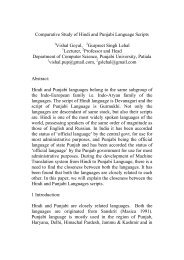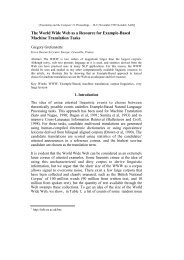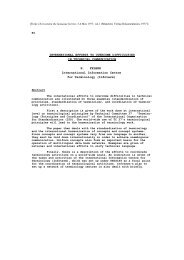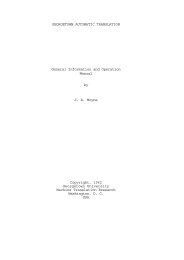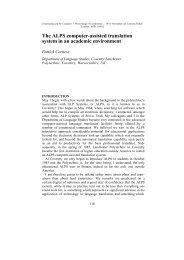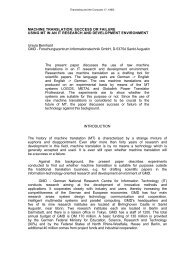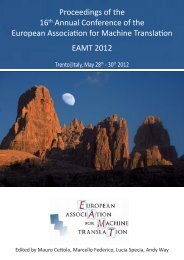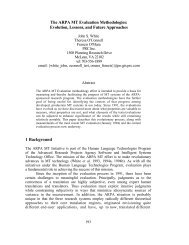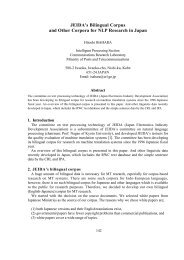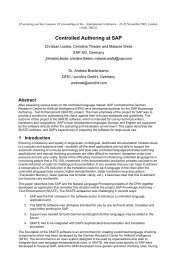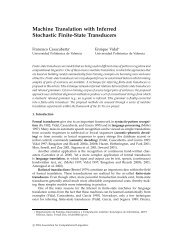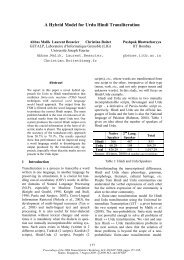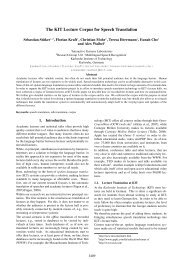pidgin translation - Machine Translation Archive
pidgin translation - Machine Translation Archive
pidgin translation - Machine Translation Archive
You also want an ePaper? Increase the reach of your titles
YUMPU automatically turns print PDFs into web optimized ePapers that Google loves.
80 META<br />
limited, however, by the lack of whatever information was lost in the <strong>translation</strong><br />
process. This is not to deny that MT is being improved by research. But the<br />
improvement is slow and requires very sophisticated efforts from linguists, from<br />
computer scientists, and eventually from researchers into artificial intelligence<br />
and information retrieval.<br />
Pidgin offers an alternative which is more accessible than either of the<br />
foregoing. It would cost less than MT because it would use less computer time.<br />
This is because the algorithms needed are comparatively simple: it only needs<br />
a dictionary look-up and perhaps a rough parsing to reduce the homographs,<br />
whereas effective MT must incorporate more complex transformational grammar<br />
for deeper semantic analysis of the source language, and also a synthesizer of the<br />
target language. No less important is the economy that Pidgin offers in the human<br />
resources needed to write the grammars and program the systems. The programmers<br />
for their part can already provide all that is needed for Pidgin CT. Pidgin removes<br />
the major obstacle to effective CT, namely that if a computer is to simulate<br />
conventional human <strong>translation</strong>, the machine has to understand the original text.<br />
In comparing Pidgin output with that of MT, we concede that it is less<br />
perspicuous to the beginner. We would therefore propose that he be given a few<br />
hints, as we have done for the Arabic example to follow. But after he has been<br />
helped to read and understand the first paragraphs, he ought to be able to go on<br />
by himself and get the gist of the article with a little effort. Thus, subject to<br />
some extra effort at the very outset, Pidgin <strong>translation</strong> should be at least as<br />
readable as MT output.<br />
To learn a Pidgin is clearly simpler and faster than learning the original<br />
language, if only because the task of learning the thousands of content words in<br />
a foreign vocabulary is mostly removed by drawing a Pidgin vocabulary from<br />
the reader's own language. So he already knows the meanings of most of the<br />
Pidgin words — not their exact semantic ranges but approximations. This follows<br />
from the constraints which we have stipulated. This much and no more already<br />
allows him to read roughly. What he must then learn by way of vocabulary is<br />
how people who speak the other language put these already familiar lexical signs<br />
to different use; it is a process similar to learning how British and Americans<br />
use English words differently, and it requires almost no formal training. As he<br />
finds words in contrast or in positions of synonymy in the Pidgin, he hones his<br />
perception of their meanings, just as he does while reading his native language<br />
(indeed nobody knows all the meaning of most words even in his own language).<br />
Finally, after reading a number of articles he can expect to read the Pidgin with<br />
an ease approaching a native's competence in reading the source language. To<br />
sum up with some insistence: benefit would continually accrue to the Pidgin user<br />
from the fact that a Pidgin is a language in its own right with a borrowed but<br />
natural syntax and lexical structure to retain a maximum of information.<br />
In the second situation which we envisioned, that of an expert desiring to<br />
keep abreast of the literature in his field, Pidgin <strong>translation</strong> offers more advantages<br />
than in the case of an ad hoc researcher wanting to read an occasional article;<br />
Vol. 15 — N° 2<br />
Juin 1970



